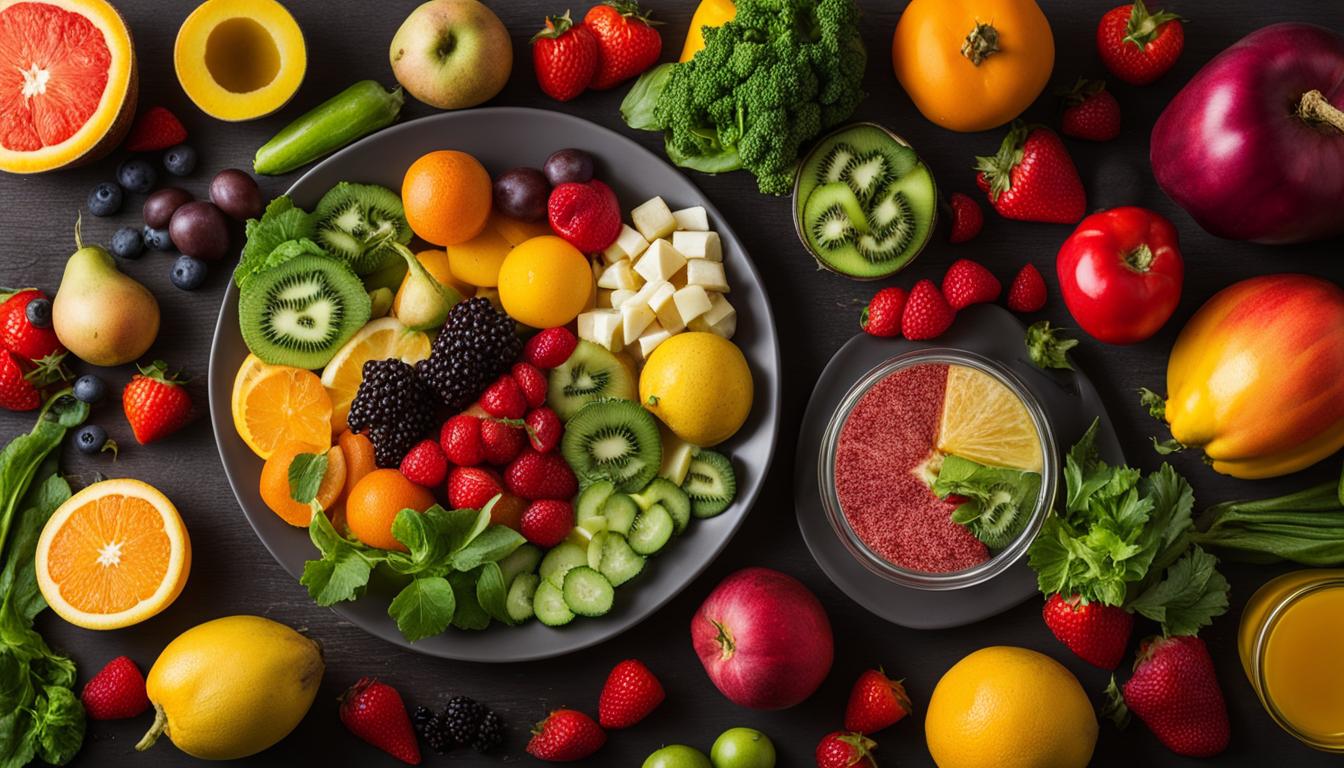Proper nutrition is crucial for maximizing workouts and improving athletic performance. The right balance of macro and micronutrients is important for fueling the body and optimizing performance. Nutrition for physical activity is highly individualized, and it is recommended to consult with a sports dietitian for personalized recommendations. Integrating nutrition and physical activity produces greater benefits than focusing on one or the other.
Key Takeaways:
- Nutrition is essential for fueling workouts and improving athletic performance
- The right balance of macro and micronutrients is crucial for optimal performance
- Consulting with a sports dietitian can provide personalized nutrition recommendations
- Integrating nutrition and physical activity produces greater benefits than focusing on one aspect alone
- Proper nutrition is highly individualized and should be tailored to individual needs
Is Nutrition More Important Than Exercise?
When it comes to optimizing athletic performance, nutrition plays a crucial role alongside exercise. While both factors are important, it’s worth exploring whether nutrition holds more significance than exercise alone. Proper nutrition provides the necessary fuel to maximize workouts and prevent fatigue, allowing individuals to push their limits and achieve their fitness goals.
Nutrition for athletic performance goes beyond simply consuming a balanced diet. It involves paying attention to the specific macronutrients and micronutrients that support optimal physical activity. For example, carbohydrates are essential for providing energy during workouts, proteins aid in muscle building and recovery, and fats help with nutrient absorption and satiety. Additionally, certain vitamins and minerals such as iron, vitamin D, and zinc can have a direct impact on fitness performance.
Research has shown that exercise influences food choices, with individuals who engage in regular physical activity tending to make healthier food choices overall. This connection between exercise and nutrition further emphasizes the interdependence of the two. Moreover, nutrition also plays a critical role in muscle recovery by reducing inflammation, enabling athletes to bounce back faster and perform at their best.
The Key Takeaway
Nutrition and exercise are both vital components of a successful fitness regimen. While exercise is essential for building strength and endurance, proper nutrition is equally important in fueling workouts, optimizing performance, and supporting overall athletic goals.
Understanding the significance of nutrition in combination with exercise can empower fitness enthusiasts to make informed choices about their dietary habits. By recognizing the specific nutrients needed to support their individual fitness goals, individuals can enhance their performance, promote muscle recovery, and ultimately achieve a higher level of fitness.
Basics About Nutrition and Weight Loss
Nutrition plays a crucial role in achieving weight loss goals. To effectively lose weight and maintain a healthy lifestyle, it is important to have a balanced diet that provides adequate nutrients while creating a calorie deficit. Here are some basics about nutrition and weight loss:
1. Macronutrients: Consuming the right balance of carbohydrates, proteins, and fats is essential for weight loss. Carbohydrates provide energy, proteins support muscle growth and repair, and fats contribute to satiety and hormone regulation.
2. Caloric Deficit: Creating a caloric deficit is key to losing weight. This means consuming fewer calories than your body burns through daily activities and exercise. It is important to find the right balance, as excessive calorie restriction can be detrimental to your health and metabolism.
3. Meal Planning: Planning your meals in advance can help you make healthier food choices and avoid impulsive, high-calorie options. Include a variety of fruits, vegetables, whole grains, lean proteins, and healthy fats in your meals to ensure you’re getting all the necessary nutrients.
4. Portion Control: Controlling portion sizes can help manage calorie intake. Use smaller plates and bowls, and be mindful of serving sizes. Focus on eating slowly and listening to your body’s hunger and fullness cues.
5. Hydration: Staying hydrated is important for overall health and weight loss. Drinking water can help boost metabolism, suppress appetite, and improve digestion. Aim to drink at least 8 cups of water per day.
Quick Tips for Weight Loss:
- Eat a balanced diet that includes plenty of fruits, vegetables, lean proteins, whole grains, and healthy fats.
- Avoid processed and high-sugar foods, as they can sabotage your weight loss efforts.
- Incorporate regular physical activity into your routine, such as cardio exercises, strength training, and flexibility exercises.
- Practice mindful eating by paying attention to your hunger and fullness cues.
- Get adequate sleep, as lack of sleep can disrupt your metabolism and increase cravings.
Remember, weight loss is a journey that requires patience and consistency. It’s important to focus on making sustainable changes to your diet and lifestyle, rather than resorting to quick fixes. Consulting with a registered dietitian can provide personalized advice and support on your weight loss journey.
Sports Nutrition for Endurance Exercise
When it comes to endurance exercise, proper nutrition is essential for enhancing performance and supporting optimal recovery. Endurance athletes require a combination of macronutrients and specific superfoods to fuel their workouts and promote muscle repair and growth. Including these nutrient-rich foods in your diet can help you excel in endurance exercise:
- Leafy Greens: Dark green leafy vegetables such as spinach and kale are packed with vitamins, minerals, and antioxidants. They can improve muscle function and support overall athletic performance.
- Berries: Berries like blueberries, strawberries, and raspberries are rich in antioxidants that help reduce muscle damage and inflammation caused by intense training sessions.
- Eggs: Known as a complete protein source, eggs provide essential amino acids necessary for muscle recovery and repair. They are also a great source of vitamins and minerals.
- Sweet Potatoes: Loaded with complex carbohydrates and potassium, sweet potatoes provide a sustained source of energy, reduce fatigue, and help prevent muscle cramps during long endurance exercises.
- Turmeric: With its powerful antioxidant and anti-inflammatory properties, turmeric aids in post-exercise recovery by reducing muscle soreness and inflammation.
By incorporating these superfoods into your diet, you can fuel your endurance exercise and optimize your performance. Remember to consult with a sports dietitian to develop a personalized nutrition plan that aligns with your specific goals and training regimen.
Nutrition’s Role in Physical Fitness: Why You Need to Consider Both
When it comes to physical fitness, nutrition plays a crucial role in supporting your goals and enhancing your performance. While exercise is important for building strength and endurance, proper nutrition provides your body with the fuel and nutrients it needs to function at its best. Integrating both nutrition and exercise into your fitness routine is key to achieving optimal results.
Dark green leafy vegetables, such as spinach and kale, are rich in important nutrients like folate, iron, and vitamin C, which are essential for muscle function and can increase muscle function in physically active individuals. Berries, such as blueberries and strawberries, are packed with powerful antioxidants that help reduce muscle damage and inflammation, aiding in post-exercise recovery. Eggs, a complete protein source, provide essential nutrients for muscle recovery and repair. Sweet potatoes, with their complex carbohydrates and potassium content, provide fuel for workouts and help reduce fatigue. And turmeric, which has antioxidant and anti-inflammatory effects, can further support post-exercise recovery.
In addition to these specific foods, hydration is also crucial for exercise performance. Drinking enough water and replacing lost electrolytes are important for preventing dehydration and maintaining optimal performance. Proper hydration helps deliver nutrients to cells and remove waste products, keeping your body functioning efficiently.
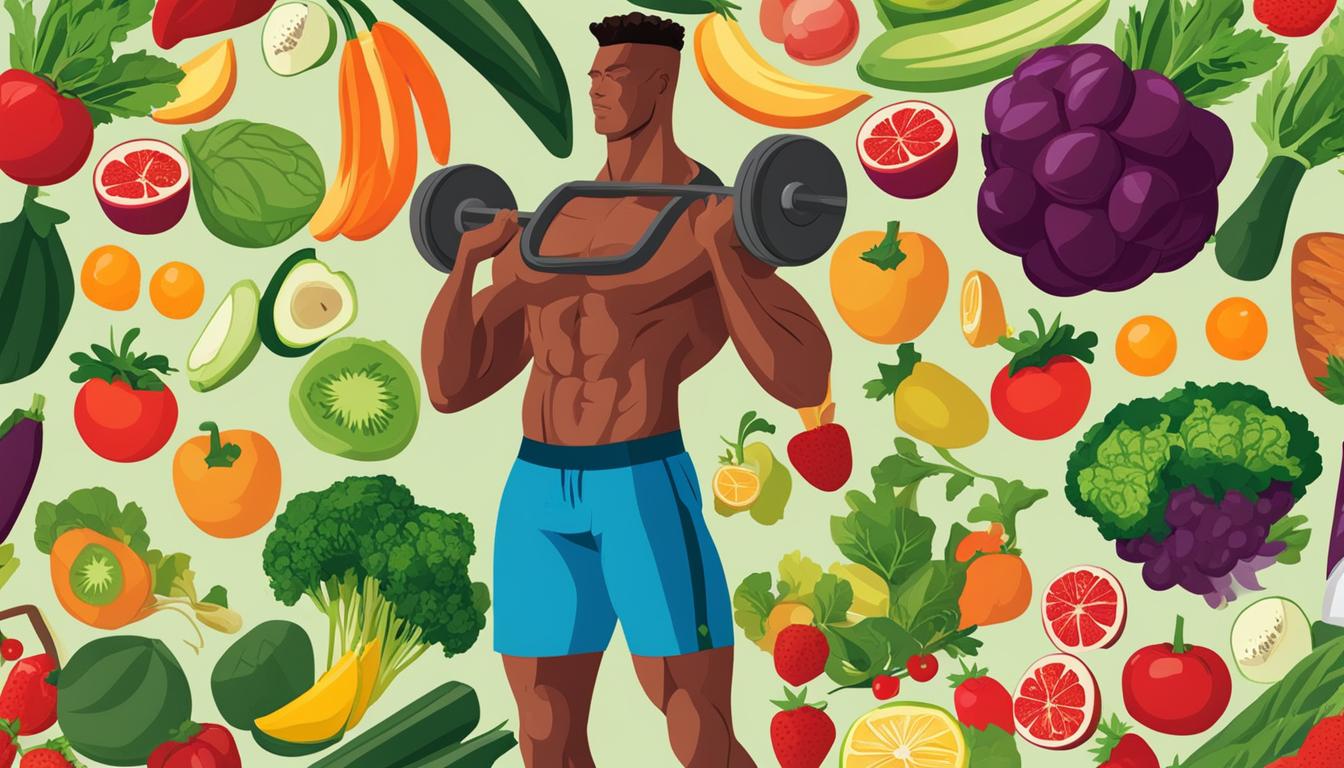
The Importance of a Balanced Diet
To support your physical fitness goals, it’s important to focus on a balanced diet that includes a variety of nutrient-dense foods. A balanced diet should consist of lean proteins, whole grains, healthy fats, fruits, and vegetables. Lean proteins, like chicken, fish, and tofu, provide the building blocks for muscle growth and repair. Whole grains, such as quinoa and brown rice, provide sustained energy for workouts. Healthy fats, like avocados and nuts, are necessary for hormone production and absorption of fat-soluble vitamins. Fruits and vegetables provide essential vitamins, minerals, and antioxidants that support overall health and recovery.
By understanding the importance of nutrition in physical fitness and incorporating a well-rounded diet, you can optimize your performance, promote muscle recovery, and achieve your fitness goals. Remember to consult with a registered dietitian or nutritionist for personalized recommendations based on your individual needs and fitness level.
Toned Arms to Tree Trunk-Size Quads: Achieving Fitness Goals Without Supplements
Achieving fitness goals doesn’t have to rely on supplements. With a nutritionally sound diet consisting of real, whole foods, athletes can fuel their bodies with the necessary calories, proteins, vitamins, and minerals. Supplements are often unnecessary when a well-balanced diet provides the right mix of nutrients from whole food sources.
According to the International Society of Sports Nutrition, consuming 1.4-2 grams of protein per kilogram of body weight is recommended for building muscle mass. This can easily be achieved through sources like lean meats, beans, and legumes. These protein-rich foods not only aid in muscle recovery and repair but also provide essential nutrients for overall health.
A real food diet offers numerous benefits. Not only does it provide the necessary nutrients for optimal fitness, but it also offers a wide range of flavors, textures, and variety. By consuming whole foods, athletes can enjoy a diverse and satisfying diet that fuels their workouts and supports their fitness goals.
Fitness Without Supplements: Benefits of a Real Food Diet
- Nutrient Density: Whole foods are packed with essential nutrients, including vitamins, minerals, and antioxidants, which support overall health and well-being.
- Sustainability: Relying on real food sources reduces reliance on processed and packaged products, promoting a more sustainable and eco-friendly approach to nutrition.
- Long-Term Health: A nutritionally sound diet based on real foods can help prevent chronic diseases, such as heart disease, cancer, and diabetes, ensuring long-term health and vitality.
- Cost-Effective: Real food can be more affordable than supplements, helping athletes save money while still achieving their fitness goals.
“By prioritizing nutrition and making informed choices about food, fitness enthusiasts can maximize their performance and reach their goals.”
With a focus on a real food diet, athletes can nourish their bodies with the nutrients they need to excel in their fitness pursuits. By choosing whole, nutrient-dense foods, they can enjoy the benefits of improved overall health, increased energy levels, and enhanced athletic performance. Ultimately, achieving fitness goals without supplements is not only possible but also a sustainable and fulfilling approach to lifelong fitness.
Protein-Packed Foods for Building Muscle
When it comes to building lean muscle mass, protein is essential. Including protein-rich foods in your diet can provide the necessary amino acids for muscle tissue repair and growth. Here are some protein-packed options to consider:
- Soy/soybeans: A great plant-based protein source that contains all essential amino acids. It is versatile and can be incorporated into various dishes.
- All beans and legumes: These are not only rich in protein but also high in fiber, vitamins, and minerals. They can be a satisfying addition to any meal or used as a meat substitute.
- Chia/quinoa seeds: These tiny seeds are packed with protein and also provide a good amount of omega-3 fatty acids. They can be sprinkled on salads, added to smoothies, or used in baking.
- Split peas/lentils: These legumes are not only rich in protein but also contain a good amount of fiber. They can be cooked into soups, stews, or used as a side dish.
- Peanuts and tree nuts: These nuts are not only a good source of protein but also provide healthy fats. They can be enjoyed as a snack or added to salads and stir-fries.
- Eggs: Eggs are a complete protein source and contain all essential amino acids. They are also rich in vitamins and minerals. Enjoy them boiled, scrambled, or as part of a dish.
- Greek yogurt: A creamy and protein-packed option that also provides probiotics for gut health. Enjoy it as a snack or use it as a base for smoothies.
- Tuna, chicken breast, salmon, shrimp, and lean beef: These animal-based protein sources are excellent for building muscle and provide essential nutrients like omega-3 fatty acids and iron.
- Cottage cheese: Cottage cheese is not only high in protein but also a great source of calcium. It can be enjoyed on its own or used as a topping for salads and desserts.
- Turkey breast: A lean protein option that is low in fat and high in muscle-building amino acids. It can be used in sandwiches, salads, or as a main protein source.
By incorporating these protein-rich foods into your diet, you can support muscle growth and recovery, helping you achieve your fitness goals. Remember to combine them with carbohydrates to provide the energy needed for recovery and exercise performance.
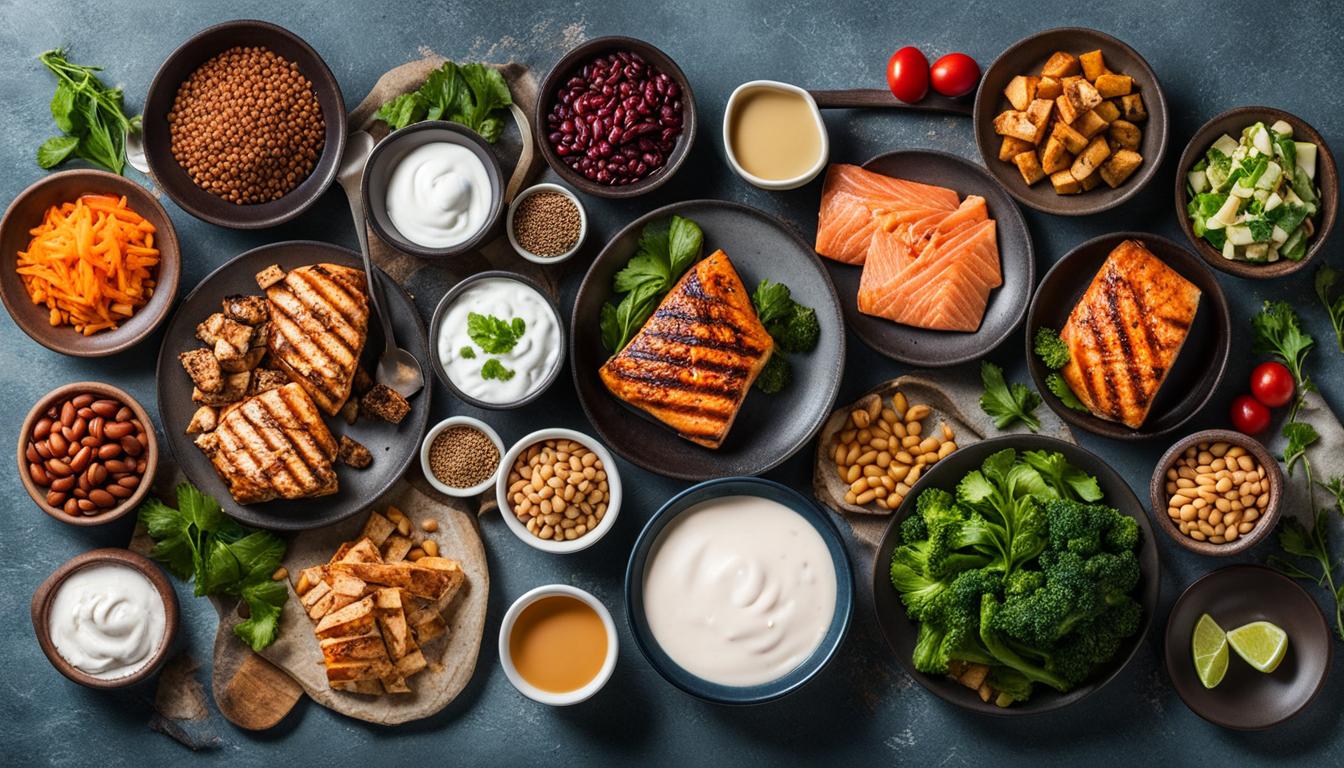
Why protein from real food sources?
“Choosing protein from real food sources, rather than relying solely on supplements, can have the same effect on muscle mass. Real food not only provides protein, but also other essential nutrients that are important for overall health and well-being.”
Including a variety of protein-rich foods in your diet ensures that you are getting a wide range of nutrients and benefits. It also promotes a sustainable approach to nutrition, focusing on whole, unprocessed foods rather than relying on isolated supplements. By nourishing your body with protein-packed foods, you can support your muscle-building goals and maintain a balanced and nutritious diet.
The Importance of Hydration for Fitness
Hydration is a critical factor in optimizing fitness performance and overall health. When it comes to exercise, maintaining proper hydration levels is essential for sustaining energy, preventing muscle cramps, and regulating body temperature. Through sweat, the body loses water and electrolytes, which need to be replenished to avoid dehydration. It is recommended to drink water before, during, and after workouts to ensure adequate hydration throughout the exercise session.
Water intake during exercise can vary depending on factors such as intensity, duration, and individual sweat rate. The American Council on Exercise recommends drinking approximately 17 to 20 ounces of water two hours before exercise and an additional 7 to 10 ounces every 10 to 20 minutes during exercise. However, these guidelines are general recommendations, and individual needs may vary. Monitoring urine color can be a helpful indicator of hydration status. A pale yellow color indicates proper hydration, while darker urine suggests dehydration.
In addition to water, electrolytes play a crucial role in maintaining hydration levels during exercise. Electrolytes such as sodium, potassium, and magnesium help to balance fluid levels in the body. Consuming sports drinks or electrolyte-rich foods can aid in replenishing these essential minerals. However, it is important to note that excessive consumption of sports drinks may lead to unnecessary calorie intake, so it’s essential to choose options that align with your specific energy needs.
In conclusion, staying well-hydrated is vital for optimal fitness performance. Adequate water intake before, during, and after exercise helps to prevent dehydration, maintain energy levels, and support overall health. Pay attention to your body’s hydration needs and adjust your water intake accordingly. By prioritizing hydration as part of your fitness routine, you can enhance your performance and maximize the benefits of your workouts.
Tips for Staying Hydrated During Exercise:
- Carry a reusable water bottle with you to easily track and drink water throughout your workout.
- If you’re engaging in intense or prolonged exercise, consider consuming sports drinks or electrolyte-rich snacks to replace lost electrolytes.
- Monitor your urine color to gauge your hydration status. Aim for a pale yellow color.
- Develop a hydration plan based on your individual needs, taking into account factors such as exercise intensity, duration, and sweat rate.
- Listen to your body’s thirst cues and drink water whenever you feel thirsty.
Nutrition for Overall Health
Proper nutrition is not only important for achieving fitness goals but also plays a key role in overall health and well-being. A balanced diet that includes lean proteins, whole grains, healthy fats, and plenty of fruits and vegetables provides essential nutrients that support bodily functions and promote optimal health. By fueling our bodies with the right nutrients, we can help prevent chronic diseases such as heart disease, cancer, and diabetes.
Eating a variety of nutrient-rich foods ensures that we get the vitamins, minerals, and antioxidants our bodies need to function properly. Lean proteins, such as chicken, fish, tofu, and legumes, help build and repair tissues, while whole grains like quinoa and brown rice provide energy and fiber. Healthy fats found in avocados, nuts, and olive oil support brain function and aid in nutrient absorption. Fruits and vegetables are packed with vitamins, minerals, and antioxidants that protect against cellular damage and help maintain a strong immune system.
By adopting a balanced and nutritious diet, we can improve our overall health and reduce the risk of chronic diseases. It is important to note that individual nutritional needs may vary, and consulting with a registered dietitian can provide personalized recommendations based on specific health goals and dietary requirements.
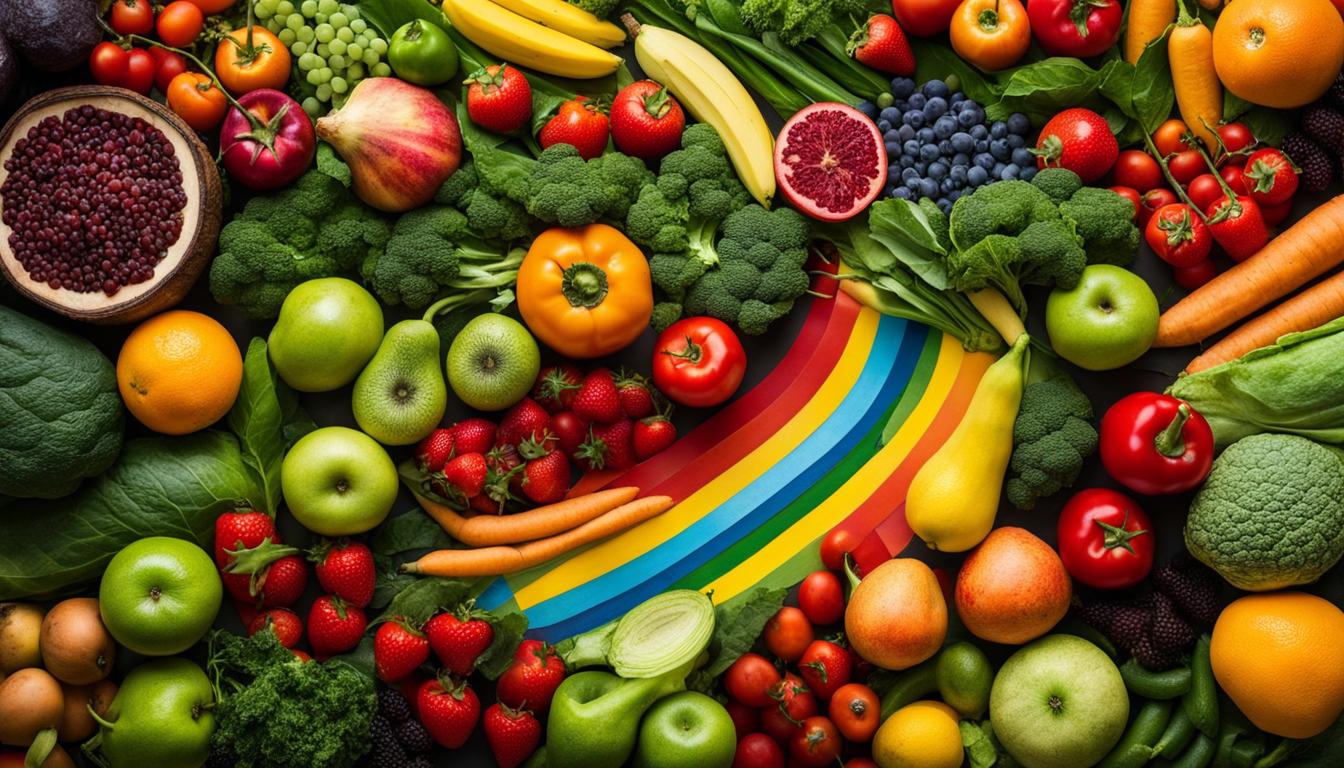
Key Takeaways:
- A balanced diet rich in lean proteins, whole grains, healthy fats, fruits, and vegetables is essential for overall health.
- Lean proteins help build and repair tissues, while whole grains provide energy and fiber.
- Healthy fats support brain function and aid in nutrient absorption.
- Fruits and vegetables are packed with essential vitamins, minerals, and antioxidants.
- Individual nutritional needs may vary, and consulting with a registered dietitian can provide personalized recommendations.
Understanding Nutrition for Fitness Goals
Proper nutrition is essential for fitness enthusiasts to achieve their goals and optimize their performance. However, many individuals lack the necessary knowledge about nutrition and its impact on their fitness journey. By understanding the basics of nutrition and adopting a balanced approach to eating, athletes can enhance their health and fitness outcomes.
Education plays a crucial role in helping athletes make informed choices about their food intake. Learning about the digestive system and the role of different nutrients empowers individuals to create a nutrition plan that supports their specific fitness goals. By focusing on whole foods and avoiding excessive reliance on supplements, athletes can fuel their bodies with the necessary nutrients for optimal performance.
When it comes to nutrition for fitness goals, it’s important to prioritize balance. Consuming a varied diet that includes lean proteins, whole grains, fruits, and vegetables provides the body with the necessary fuel and nutrients for sustained energy, muscle recovery, and overall well-being. Rather than fixating on quick fixes or fad diets, athletes should aim for a sustainable approach to nutrition that promotes long-term success.
Ultimately, understanding and prioritizing nutrition is a powerful tool for achieving fitness goals. By investing in nutrition education and making informed choices about food, athletes can unlock their full potential and maximize their performance.
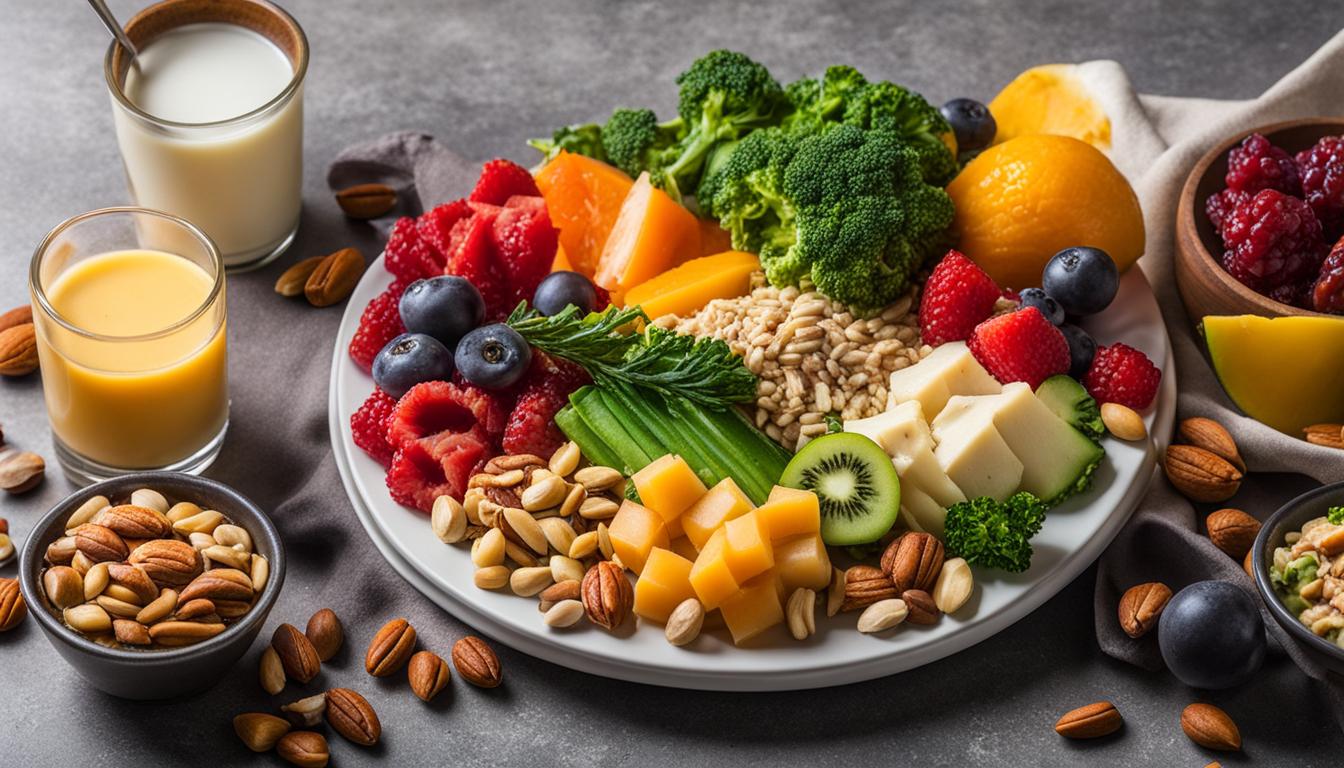
Conclusion
Exercise and nutrition are inseparable when it comes to achieving optimal fitness and performance. The right balance of macronutrients and proper hydration play a crucial role in fueling workouts, promoting muscle recovery, and helping you reach your fitness goals. It’s important to prioritize a balanced diet that includes lean protein, whole grains, fruits, and vegetables to support overall health and prevent chronic diseases.
By making informed choices about food and understanding the impact of nutrition on exercise performance, you can maximize your results. Remember that nutrition is highly individualized, so consulting with a sports dietitian can help you develop a personalized plan that suits your specific needs. Integrating nutrition and exercise not only enhances physical performance but also produces greater health benefits than focusing on one alone.
So, whether you’re a fitness enthusiast, an athlete, or simply someone looking to lead a healthier lifestyle, nutrition is a key component of your journey. By fueling your body with the right nutrients and staying properly hydrated, you can optimize your workouts, promote muscle recovery, and achieve your fitness goals. Embrace the power of nutrition and make it an integral part of your exercise routine for long-term success.
FAQ
What role does nutrition play in fitness?
Nutrition is crucial for maximizing workouts and improving athletic performance. The right balance of macro and micronutrients fuels the body and optimizes performance.
Should I consult with a sports dietitian for personalized nutrition recommendations?
Yes, nutrition for physical activity is highly individualized. It is recommended to consult with a sports dietitian for personalized recommendations.
How does nutrition influence muscle recovery?
Proper nutrition plays a role in muscle recovery by reducing inflammation. Consuming adequate carbohydrates, proteins, and fats is important for optimal exercise performance and recovery.
What are some superfoods that can benefit athletic performance?
Superfoods like leafy greens, berries, eggs, sweet potatoes, and turmeric are beneficial for athletic performance due to their high antioxidant content, complex carbohydrates, and protein.
Are supplements necessary for achieving fitness goals?
Proper nutrition from real, whole foods is often sufficient for athletes to obtain the necessary calories, proteins, vitamins, and minerals. Supplements are not usually necessary if the right balance of nutrients is obtained from whole foods.
What foods are high in protein for building muscle?
Foods high in protein include soy/soybeans, all beans and legumes, chia/quinoa seeds, split peas/lentils, peanuts and tree nuts, eggs, Greek yogurt, tuna, chicken breast, salmon, shrimp, lean beef, cottage cheese, and turkey breast.
Why is hydration important for exercise performance?
Adequate hydration is vital for overall health and exercise performance. Drinking enough water and replacing lost electrolytes prevents dehydration and maintains optimal performance.
How does nutrition impact overall health?
Nutrition plays a key role in overall health and can help prevent chronic diseases like heart disease, cancer, and diabetes. A balanced diet rich in lean protein, whole grains, healthy fats, fruits, and vegetables is essential for maintaining good health.
Can you achieve fitness goals without supplements?
Yes, achieving fitness goals can be done without relying on supplements. Proper nutrition from real, whole foods is often sufficient for athletes to get the necessary calories, proteins, vitamins, and minerals.
Do I need to understand nutrition to reach my fitness goals?
Yes, understanding the basics of nutrition and eating balanced meals can lead to better health and fitness outcomes. Education about the digestive system and the role of different nutrients is crucial for making informed choices about food.
How do nutrition and exercise work together for optimal fitness?
Exercise and nutrition go hand in hand for optimal fitness and performance. Proper nutrition, including the right balance of macronutrients and adequate hydration, is essential for fueling workouts, promoting muscle recovery, and achieving fitness goals.

